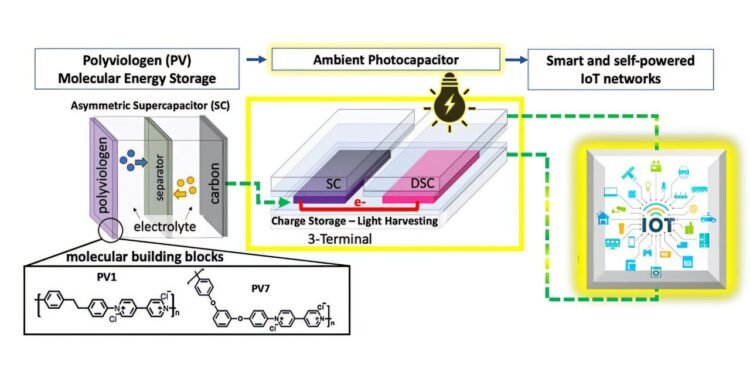
A landmark international collaboration led by Newcastle University has developed the world’s most efficient integrated light-harvesting and storage system for powering autonomous Artificial Intelligence (AI) at the edge of the Internet of Things (IoT).
The technology, published in the journal Energy & Environmental Science, pioneers a battery-free, maintenance-free platform for next-generation smart sensors and devices—heralding a transformative shift toward sustainable, intelligent infrastructure.
At the heart of this breakthrough is an innovative three-terminal photocapacitor—a device that merges a high-efficiency hybrid photovoltaic, a molecularly engineered supercapacitor, and eco-friendly, mushroom-derived chitosan membranes into a seamless system.
This compact unit achieves a record photocharging voltage of 0.9 V and overall charging efficiency of 18% under typical indoor lighting, enabling continuous, battery-free operation of IoT networks and edge AI. In real-world tests, the platform powered image recognition tasks with 93% accuracy at just 0.8 mJ per inference, outperforming commercial silicon modules by a factor of 3.5 in throughput.
Professor Marina Freitag, chair of energy, Royal Society University Research Fellow, Newcastle University, who co-conceived and led the project, said, “This has been an idea brewing for almost a decade, bringing together everything from fundamental molecular engineering to real-world edge AI applications.
“I am absolutely delighted to see it finally realized—not just as an academic curiosity, but as a fully integrated, working system. It proves that only through deep, international collaboration can we solve the multi-faceted challenges of sustainable, intelligent technology.”
A sustainable future for billions of devices
With more than 30 billion IoT devices projected by 2030, the challenge of powering ubiquitous, wireless, smart systems—without toxic batteries or grid connection—is one of the defining issues in technology and sustainability.
This work demonstrates a viable, high-performance solution for indoor environments, paving the way for zero-maintenance, energy-autonomous infrastructure in homes, hospitals, factories, and cities. It directly answers the United Nations Sustainable Development Goal 7 for affordable and clean energy and could help reduce the environmental impact of billions of disposable batteries annually.
Building the foundation for smart, sustainable societies
The implications stretch far beyond the lab. This technology is a game-changer for smart cities, health care, industrial automation, and environmental monitoring—enabling networks of sensors and edge devices that require zero maintenance and have minimal environmental impact. By uniting molecular engineering, biodegradable materials, advanced simulation, and real-world AI integration, the team has set a new benchmark for what is possible when science and collaboration know no borders.
Professor Freitag adds, “Collaboration is the only way to tackle the multi-faceted problems of tomorrow’s technology. Our joint success is not just a scientific breakthrough—it’s a template for how global, cross-disciplinary teams can deliver the innovations society needs.”
More information:
Natalie Flores Diaz et al, Unlocking High-Performance Photocapacitors for Edge Computing in Low-Light Environments, Energy & Environmental Science (2025). DOI: 10.1039/D5EE01052G
Newcastle University
Citation:
New standard developed for battery-free, AI-enabled IoT devices (2025, April 28)
retrieved 28 April 2025
from https://techxplore.com/news/2025-04-standard-battery-free-ai-enabled.html
This document is subject to copyright. Apart from any fair dealing for the purpose of private study or research, no
part may be reproduced without the written permission. The content is provided for information purposes only.










